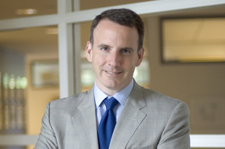Scranton Lecture Portrays Cities as Positive Economic and Cultural Forces

Edward Glaeser, Ph.D., the Fred and Eleanor Glimp Professor of Economics in the Faculty of Arts and Sciences at Harvard University, will discuss “Economics of the City” at The University of Scranton’s fall Henry George Lecture on Monday, Oct. 22, at 7:30 p.m. The lecture, which is free and open to the public, will take place in the McIlhenny Ballroom at the DeNaples Center on campus.
Dr. Glaeser has taught since 1992 at Harvard. He is the drector of the Taubman Center for State and Local Government and director of the Rappaport Institute for Greater Boston. Dr. Glaeser is also a senior fellow at the Manhattan Institute and contributing editor to City Journal. He teaches urban and social economics and microeconomic theory. He received his Ph.D. from the University of Chicago in 1992, the same year he joined the faculty at Harvard University.
Dr. Glaeser’s work focuses on the determinants of city growth and the role of cities as centers of idea transmission. His recent book, “Triumph of the City,” argues that cities are actually healthier, greener, and richer (in cultural and economic terms) places to live than rural areas. He reminds us why we should nurture our cities or suffer consequences that will hurt us all, no matter where we live.
Dr. Glaeser is the author of several influential magazine articles, such as “Engines of Innovation” published in Scientific American and “New Land of Opportunity” published in Forbes. He is also a regular columnist for Bloomberg View. Dr. Glaeser has published a long list of papers and commentaries on cities, economic growth, and law and economics. Some of his academic articles appear in esteemed journals such as American Economic Review, Quarterly Journal of Economics, and Journal of Economic Perspectives.
The Henry George Lecture Series is organized by the Economics and Finance Department at The University of Scranton and the campus chapter of Omicron Delta Epsilon, an international honor society for economics. The Henry George Lecture Series is funded by a grant from Robert Schalkenbach Foundation. The Foundation was established in 1925 to propagate the ideas of the nineteenth century economist and social reformer Henry George as set forth in his book “Progress and Poverty” and other works – ideas that are popularly known as the single tax on land values and international free trade. The Foundation sponsors research based on the recognition that equal rights to the earth is key to a just, sustainable, and prosperous economic system.
The Henry George Lecture Series is the preeminent public lecture series in economics in Northeastern Pennsylvania. The list of many distinguished speakers at previous lectures includes eight Nobel Laureates: Tom Sargent, winner of the Nobel Prize in Economics in 2011; Peter Diamond, winner of the Nobel Prize in Economics in 2010; Paul Krugman, winner of the Nobel Prize in Economics in 2008; Joseph Stiglitz, winner of the Nobel Prize in Economics in 2001; George Akerlof, winner of the Nobel Prize in Economics in 2001; Amartya Sen, winner of the Nobel Prize in Economics in 1998; Robert Lucas, winner of the Nobel Prize in Economics in 1995; and Robert Solow, winner of the Nobel Prize in Economics in 1987.
For additional information about the Henry George Lecture, contact The University of Scranton, Department of Economics and Finance at (570) 941-4048.






